In Omaggio a Mamma
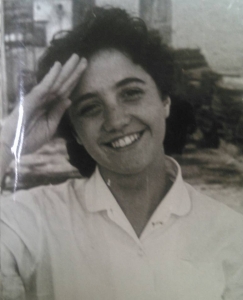
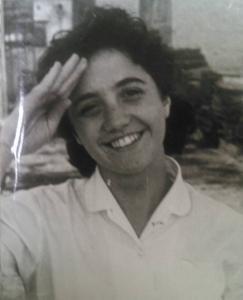
(Literally. Right off the boat.)
That 17-year-old was my mother. A year before that, as a 16-year-old cutie, Albinella Magliulo had met a handsome 22-year-old American named Richard Hicks in Naples, where he was stationed in the Navy, and they fell in love—apparently through mime, since they didn’t speak each other’s language—and were married at the little cathedral where she attended mass every Sunday. Eventually, his tour over, he came back to New York to find a job, and once he had done so, she voyaged over by herself on a ship, waited alone on the dock for her new husband to come get her (traffic jam on the West Side Highway, apparently), and then immediately assumed the role of American housewife.
At seventeen.
She had learned a little English before her voyage (from one of my father’s Navy buddies), learned more after arriving here (by attending night class, watching soap operas, and practicing with her new friends, sister-in-law, and neighbors) and gradually she would learn to communicate freely and fluently, eventually earning her American citizenship. But at first, it was certainly a struggle. She tells funny stories about herself (one day she found a bee in the bathroom, called my father at work and said something like “There’s an animal in here,” and my father called my grandfather, who burst into their home wielding a gun), and she says she was fine back then, it was no problem at all, but there must have been many long and lonely days, all alone by herself. Still, she fought through her linguistic hurdles as well as her emotional hardships (such as the loss of her daughter, my sister Sandra), to become the emotional core of our house, our domestic engineer.
I didn’t fully appreciate any of this when I was growing up. I mean, I knew I had the prettiest mother in the neighborhood, and I enjoyed being the recipient of her affection and care; but she was also the rule-maker, the one I had to rebel against as I grew older. But now, I think back to what it must have been like for her and am filled with appreciation. I mean, really. Could I have done what she did when I was that age? Highly unlikely. But there she was, having left her big, happy, well-to-do Italian family, barely scraping by with her working-class husband while being seen by some as a WOP who was using her marriage as a means to a better life—even though in reality she had taken a huge socio-economic step down. For love.
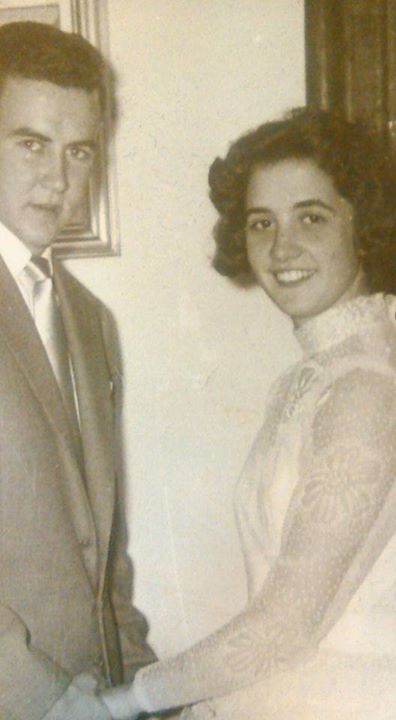
In my limited travels abroad, I have, on rare occasions, been to places where nobody spoke English. We are extremely fortunate people, we who speak this language, because we can count on there being somebody else–hotel clerks, taxi drivers, waiters–speaking it almost anywhere we go. Not so for any of the other six billion people occupying this planet. And certainly not so for a seventeen-year-old Italian immigrant in 1955.
I still don’t know how she did it. Classically educated in Italy, she was a very intelligent young woman, but she felt suddenly stupid, unable to carry on conversations, and as a result she muted her bright personality, often lapsing into silence in social situations. But she persevered. In fact once she had children, she refused to raise us as bilingual, and learned how to cook American food (hot dogs and baked beans, casseroles, turkey with brown gravy, boiled veggies with margarine, etc.)–all out of a determination to assimilate, to be a good citizen of her new country, to be a good wife to her American husband (who didn’t like fish, spicy foods, or even homemade ravioli!), to be a good mother to her American children.
When I was a boy, visiting Italy with my mother, our roles would suddenly reverse—she speaking happily and brightly in her native tongue, I faltering, struggling to put together coherent sentences, desperately translating in my head, trying to make sense of conversations around me. It was then that I would get a taste—just a taste—of what it must have been like for her in the first months of her new life in America. Years later, as a traveling adult—at a campsite in Patagonia, in a small village in rural France, in a shop in Prague, in a Gaelic-speaking church in Ireland—I would again experience such moments of alienation, listening to natives speaking in what was for me a linguistic cacophony, “full of sound and fury, signifying nothing.” But at the same time I was aware that this was, for me, just a moment; for my mother, that’s what it was like every minute of every day of her life.
After Cynthia and I chatted about this in the car, I called my mother to tell her how much I admired her, and to acknowledge how hard it must have been for her back then. She characteristically laughed it off, complaining that she still had an accent she should have lost by now and relaying some of her embarrassing English-language moments from those early days.
She has a tough time taking a compliment, my mother.
So after I told her I have always loved her accent, and that everyone who has ever spoken another language has had an accent, and that despite all her funny English mishaps she deserved a lot of credit for learning a new language completely on her own and adapting to a totally different culture, only to have her continue to deflect my compliments, I thought I might write it all down. If I did, I thought, she wouldn’t be able to deflect it; she wouldn’t be able to talk over me, joke about it, or change the topic.
So here it is, Mom: You’re amazing. Sei una donna straordinaria. You were just a girl, and look what you did. You learned a new language; you raised three children and endured the unendurable loss of a fourth; you supported your husband through his stressful jobs, his unjust firing, his risky purchase of a convenience mart (for years cooking huge pots of soup for him to sell there), his low wages as a security guard; you took on minimum-wage jobs when we needed extra money and have worked every year since, are in fact still working at age 77, never taking it easy, not for a single year of your life; and through all this you have loved us, loved your extended American family, loved our spouses, loved your grandchildren and step-grandchildren, loved us all more and more in fact as we have all aged, despite all the crap we have pulled.
If I were your friend or therapist, I would tell you to take it easy now, to fully retire, to spend more time in Italy, to let your children support you for a change. But I’m not, I’m just your son, and I know very well how stubborn you are, so all I will say is this:
Thank you.
Grazie mille.
Thank you for all your love, and thank you for being the kind of person I not only love back but also admire. Thank you for showing us all what grit and determination and optimism look like. And thank you for being so brave back then, back when you were a kid. For without you, without that bravery, where would we be?
Come siamo fortunati di avere una madre così coraggiosa e simpatica! Siamo molto grati, e ti vogliamo moltissimo bene.

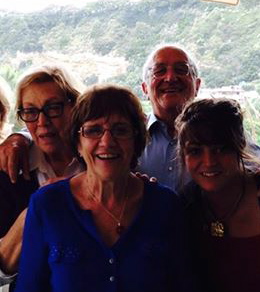


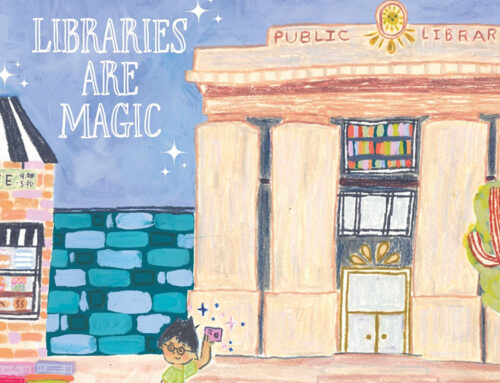
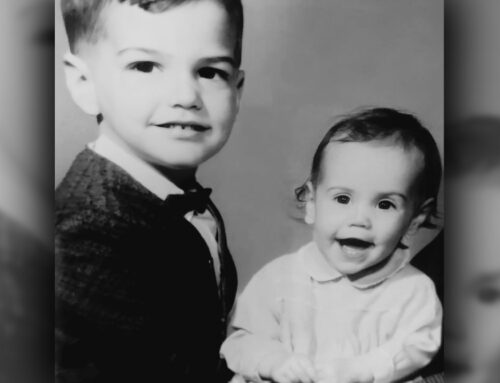
Well said David!
This was a beautiful story about a beautiful woman!!!!She is blessed and so is he
How very kind of you, Marguerite!
oh David,what a well written letter, and so happy that you are so capable of writing so well. thank you for the sharing of your wonderful Mother and family,all of the memories, so much love expressed here.
Thanks so much, Phil!
I’m late thanking you for this, Philip, but thank you! You’re as kind as your own mother was.
What a beautiful tribute to your mother, and so very true! Written from your heart and made me cry. Joan S
Thanks so much, Joan!
Thank you, dear Joan!
Love this- very beautiful. It’s an interesting and sometimes challenging place to try to look at our parents as peers- I hope your Mom was able to take your gratitude and hold it in her heart.
Dr. Hicks, It takes great Family to make a great man such as yourself, congratulations. And thank you for inspiring my Sara, you touched her inner spirit. Ihave even written a book of my Dad’s journey. Best wishes enjoy your successes J.L.. Barnes
Hi, David,
we don’t know each other but thanks for writing the story of your mom. Last night my father told me the story of one of his cousins who left Pozzuoli to pursue the great love Sam when he was only 16 years old. Her cousin was Albinella Magliulo.
I must say that the story struck me to the point of doing a little online research until I landed on your blog, imagine my surprise when I was able to read the same story that my father had told me.
After bradyseism my father moved to Naples and lost contact with many relatives, thanks to this blog and your words today I was able to tell my father that Albinella’s departure was the right choice.
Thank you again David, we wish you the best.
Maurizio e Lucio
P.S:
Sorry for my bad English!
Ciao, cugini!
Non credo che aver incontrato tuo padre durante le mie visite in Italia –come si chiama, lui? (“Lucio”= tuo padre o tuo fratello?) Mia madre ha parlato di un cugino (Antonio?) con cui ha crescuto nella stessa casa/edifice a (nella?) via Marconi. Forse questo cugino e’ tuo padre.
Scusa che il mio italiano sia terribile!
David
Ho appena letto la tua e-mail a mia madre e lei si è molto eccitata. Ha detto che c’erano tre fratelli, Peppino, Antonio e Lucio, che sono cresciuti con lei, quindi immagino che Lucio sia tuo padre e che tu abbia circa la mia età? (Ho sessant’anni.)
David
Hi David,
yes, Lucio is my father and Peppino and Antonio are my uncles. Peppino lives still in Pozzuoli while my father and uncle Antonio live in Naples. Each of them has two children, so you have many cousins here! My father Lucio was the younger and I am 45 years old. My fathers says that Sam taught them to play basketball!
Albinella’s story is etched in my fathers’ mind and he was very happy to read your words about your mother. I do know if Albinella knows also my mother Anna, probably yes.
When were you last in Italy? We look forward to seeing you soon.
Maurizio
I laud you, David, for posting this marvelous story of your mother today. I always felt that our birthday celebrations were a bit askew since we make them all about ourselves, when really it was our mothers who did all the labor. So apt to turn the spotlight on this remarkable woman on your birthday. When I got older, I used to send flowers to my mom on my birthday just to let her know that she was really the star of the show.
I know what you mean when you say you had the prettiest mother in the neighborhood. The same was true for mine. 100% Italian women could light up any room!
Hi Anita! I haven’t checked this site for a while so I just saw this. Thank you! And yes, I’m sure your mother was gorgeous. :-)
David